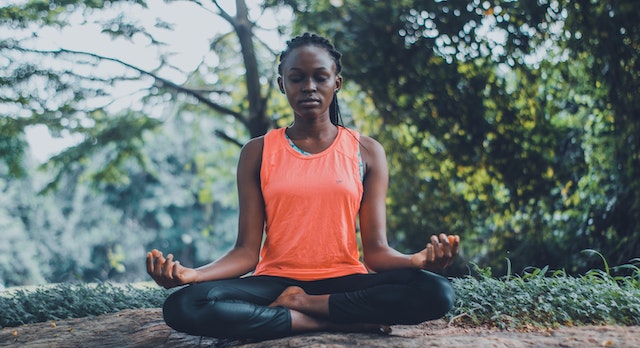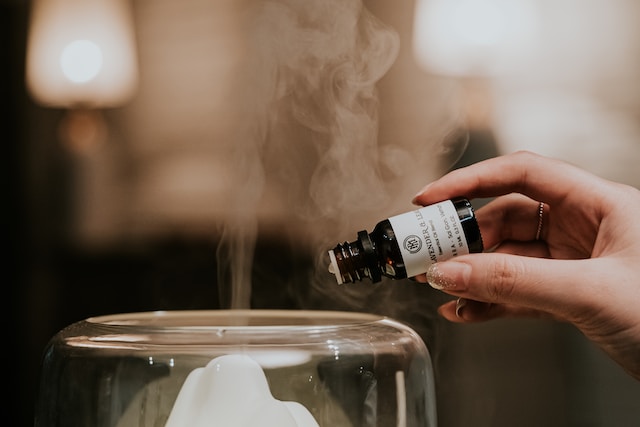Essential Oils For Meditation: Enhancing Your Practice With Aromatherapy
There are some affiliate links below, but they are all products I highly recommend. For more info, view my disclosure here.
Are you looking for ways to enhance your meditation practice?
Have you considered incorporating the use of essential oils into your routine?
Aromatherapy has been used for centuries to promote relaxation, reduce stress, and improve overall well-being.
By using essential oils during your meditation practice, you can deepen your connection with your inner self and create a more peaceful and calming environment.
In this article, you will learn the basics of aromatherapy and the benefits of using essential oils for meditation.
You will also discover how to choose the right oils for your needs and how to incorporate them into your meditation practice.
With the help of essential oils, you can create a more fulfilling and restorative meditation experience.
Understanding the Basics of Aromatherapy
You’re missing out on a whole world of relaxation if you don’t know the basics of how scents can affect your mind and body.
Aromatherapy is a holistic healing practice that uses essential oils to promote physical and emotional well-being. By inhaling the aroma of essential oils, you can activate your olfactory system, which is connected to the limbic system of your brain. This part of your brain is responsible for regulating emotions, memories, and behavior.
Essential oils are highly concentrated plant extracts that are derived from flowers, leaves, roots, and other parts of plants. They contain natural chemical compounds that have therapeutic properties. There are many different types of essential oils, each with its own unique scent and healing properties.
Some of the most popular oils for meditation include lavender, frankincense, sandalwood, and bergamot. To use essential oils for meditation, you can add a few drops to a diffuser, inhale them directly from the bottle, or apply them topically to your skin.
When you inhale essential oils, the scent molecules travel through your nose and into your lungs, where they are absorbed into your bloodstream. This can have a calming and grounding effect on your mind and body, helping you to relax and focus during meditation.
In summary, aromatherapy is a powerful tool for enhancing your meditation practice. By understanding the basics of how scents can affect your mind and body, you can choose the right essential oils to support your meditation goals. Whether you want to reduce stress, increase focus, or promote relaxation, there is an essential oil that can help you achieve your desired state of mind.
So why not give it a try and see how essential oils can enhance your meditation practice?

Benefits of Using Essential Oils for Meditation
When you incorporate the power of natural scents into your meditation routine, you may discover a newfound sense of peace and clarity. Essential oils are known for their therapeutic benefits, and when used during meditation, they can enhance your practice by calming your mind and promoting relaxation.
The act of inhaling the aroma of essential oils can stimulate the limbic system, which is responsible for emotions, memories, and motivation. This stimulation can help you achieve a more profound meditative state.
Another benefit of using essential oils for meditation is that they can help you focus and concentrate. Certain oils, like peppermint and rosemary, have stimulating properties that can increase mental clarity and alertness. When you use these oils during meditation, you can improve your ability to concentrate on your breath or mantra.
Additionally, essential oils like lavender and chamomile have calming properties that can reduce stress and anxiety, making it easier to quiet your mind and focus on the present moment.
Essential oils can also help you create a sacred space for your meditation practice. When you diffuse essential oils in your meditation room or use them to clean the space, you can create an atmosphere that promotes relaxation and peace. Certain oils, like frankincense and sandalwood, have been used for centuries in spiritual practices because of their grounding and centering effects. By incorporating these oils into your meditation routine, you can create a space that feels safe and sacred, allowing you to deepen your practice.
Incorporating essential oils into your meditation practice can be a powerful tool for enhancing your overall well-being. By using oils that promote relaxation, focus, and sacredness, you can create a deeper connection with your inner self and the present moment. Whether you choose to diffuse essential oils, apply them topically, or inhale them directly, you can experience the benefits of aromatherapy during your meditation practice and beyond.
Choosing the Right Essential Oils for Your Needs
Picking the perfect scents to suit your needs can transport you to a peaceful, fragrant oasis and help you achieve a deeper level of relaxation during your sessions.
With a wide variety of essential oils available in the market, it can be overwhelming to choose the right one. The first step in choosing the right oil is to identify the purpose of your meditation.
For instance, if you want to calm your mind and reduce anxiety, lavender oil is an excellent choice, while peppermint oil is ideal for boosting energy and focus.
It’s also crucial to consider personal preferences, as everyone responds differently to scents. Experiment with different oils to find the ones that work best for you.
Aromatherapy blends are also an excellent option, as they combine different oils for a more potent effect. However, be cautious when mixing oils and follow recommended dilution ratios to avoid allergic reactions or skin irritation.
Lastly, ensure that you purchase high-quality essential oils from reputable sources. Low-quality oils may contain harmful chemicals or synthetic fragrances that can be detrimental to your health.
Look for oils that are pure, organic, and extracted through steam distillation or cold pressing to preserve the natural benefits of the plant. Always read the label and check for any additional ingredients or additives to make an informed choice.
In conclusion, selecting the right essential oils for your meditation practice is a personal preference that requires experimentation and research. Identify the purpose of your meditation, consider personal preferences, and choose high-quality oils from reputable sources to ensure a safe and effective experience.
With the right oils, you can enhance your meditation practice and achieve a deeper level of relaxation and peace.
Incorporating Essential Oils into Your Meditation Practice
Incorporating essential oil blends into your mindful sessions can elevate your experience and create a more soothing ambiance.
One way to use essential oils during meditation is to diffuse them in the air. This method will allow you to inhale the aroma and benefit from the therapeutic properties of the oils. You can use a diffuser that uses water or one that operates with just the essential oils.
Another way to incorporate essential oils into your practice is to apply them topically. Dilute the oil with a carrier oil and apply it to your temples, wrists, or the soles of your feet. This method is especially useful if you’re looking for a more targeted effect from the oils.
For example, if you’re feeling anxious, you might apply lavender oil to your temples to help calm your mind. You can also use essential oils in combination with other mindfulness practices such as yoga or breathing exercises.
For example, you might apply peppermint oil to your chest before starting a pranayama exercise to help open up your airways and enhance your breathing. Or, you might use a blend of oils during a restorative yoga practice to help create a calming environment.
Incorporating essential oils into your meditation practice can be a powerful way to enhance your experience. Whether you choose to diffuse the oils or apply them topically, the therapeutic properties of the oils can help you to feel more relaxed, focused, and centered.
Experiment with different oils and blends until you find the ones that work best for you and your unique needs.
Creating a Calming and Relaxing Environment with Aromatherapy
Creating a calming and relaxing environment can be easily achieved with the help of some fragrant aromas. One of the best ways to do this is by using essential oils during your meditation practice. Essential oils like lavender, chamomile, and ylang-ylang have been proven to have calming effects on the mind and body.
These oils have a soothing aroma that helps to reduce stress and anxiety, and they can also help to promote a restful sleep. To create a calming and relaxing environment with aromatherapy, you can use an essential oil diffuser or add a few drops of essential oil to a bowl of hot water.
You can also mix a few drops of essential oil with a carrier oil like coconut oil or jojoba oil and use it as a massage oil. Applying the oil to your temples, neck, and shoulders can help to release tension and promote relaxation. Another way to incorporate aromatherapy into your meditation practice is by using scented candles.
Candles with scents like vanilla, peppermint, and eucalyptus can help to create a calming atmosphere. The flickering light of a candle can also help to soothe the mind and provide a focal point for your meditation. Incorporating essential oils and aromatherapy into your meditation practice can help to enhance your experience and promote relaxation.
By creating a calming and relaxing environment with the help of fragrant aromas, you can reduce stress, anxiety, and tension, and improve your overall well-being. So, the next time you meditate, try incorporating essential oils or scented candles to help you relax and release tension.
Essential oils can be a powerful tool to enhance your meditation practice.
By understanding the basics of aromatherapy, choosing the right oils for your needs, and incorporating them into your routine, you can create a calming and relaxing environment that will help you achieve a deeper sense of peace and mindfulness.
Remember, the key is to experiment and find what works best for you. Whether you prefer the soothing scent of lavender or the uplifting aroma of peppermint, there are countless essential oils to choose from that can help you achieve your meditation goals.
Read Next: Essential Oils For Sleep: Aromatherapy For Restful Nights And Better Dreams





